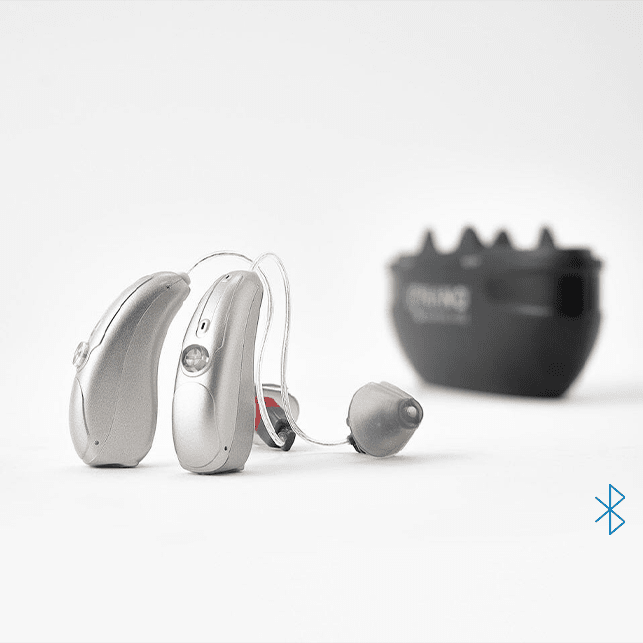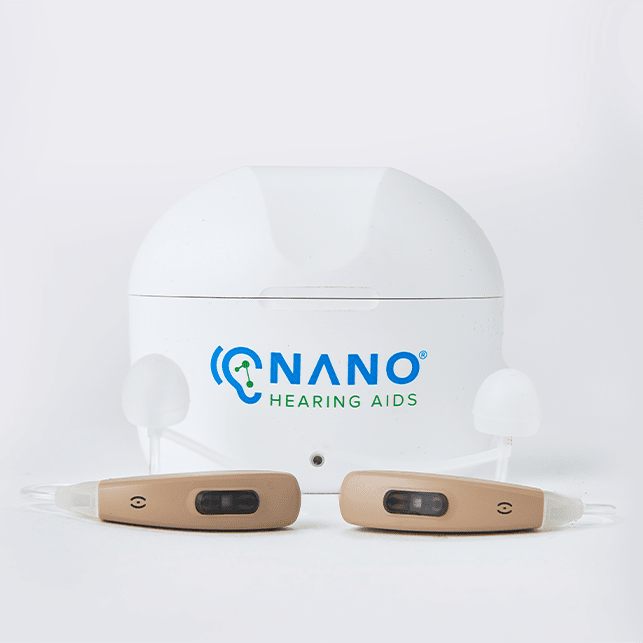Key Takeaways
How are Hearing Loss and Dementia Related?
Let’s say you're enjoying a family dinner, however the chatter around you fades into a distant hum. You strain to listen, but the words slip away, leaving you feeling isolated. This isn't just a sign of aging - it may be an indication of dementia with hearing loss, where hearing impairment is intertwined with cognitive decline, affecting how you process and understand sounds. With dementia and hearing loss, the ears might pick up sounds, but the brain struggles to interpret them. This disconnect can exacerbate cognitive symptoms, making it a health concern that needs addressing with urgency and care.
Degrees of hearing loss:
NANO Hearing Aids are FDA-registered, Class I devices. Our OTC hearing aids are designed for individuals over 18 years of age with perceived mild to moderate hearing impairment. With prices starting at just $297, they offer a viable solution for those looking to improve their hearing without breaking the bank.
Causes of Dementia-Related Hearing Loss
Several factors can lead to hearing loss in people suffering from dementia. Age is a common culprit, as both hearing and cognitive functions can decline over time.
Prolonged exposure to loud noises can damage the delicate inner ear structures, leading to hearing loss that may contribute to cognitive decline. Additionally, certain medical conditions like diabetes or hypertension can affect blood flow to the brain and ears, impacting hearing and cognitive abilities.
Common Causes:
Symptoms of Loss in People with Dementia
Recognizing the signs of hearing loss in people with dementia is crucial for early intervention. Difficulty following conversations, especially when there's background noise, is a telltale sign. You might find yourself reading lips more often or becoming increasingly frustrated during discussions.
Social gatherings become exhausting, not enjoyable, as you work harder to keep up with what's being said. Changes in your ability to remember or concentrate can also signal an underlying problem that's more than just ear-deep.
Look out for these indicators:
Being mindful of these symptoms can prompt you to seek help sooner - the earlier you catch it, the more you can do to manage it. In the next sections, we'll delve into how dementia-related hearing loss is diagnosed and what treatment options are available to help you or your loved ones stay engaged and connected.
Diagnosing Hearing Loss in Dementia Cases
Diagnosing hearing loss in people with dementia involves a multi-step process that starts with recognizing the symptoms. If you or a loved one is experiencing difficulty in hearing or cognitive challenges, the first step is to consult with a healthcare professional. They will likely refer you to an audiologist, a specialist in hearing health, who will conduct a series of tests to assess your hearing ability.
These tests often include a pure-tone audiometry, which measures your ability to hear a range of sounds at different volumes and pitches, and speech audiometry, which evaluates your ability to understand speech at different loudness levels. Additionally, a comprehensive medical evaluation may be necessary to identify any underlying conditions contributing to hearing loss and cognitive decline. This dual approach helps to create a clear picture of your auditory and cognitive health, paving the way for an effective treatment plan.
Treatment Options for Hearing Loss
Once a diagnosis is established, treatment options can be explored. The primary goal is to improve hearing and support cognitive function, which can significantly enhance quality of life. The right treatment plan is personalized, taking into account the severity of hearing loss, the individual's lifestyle, and the level of cognitive decline.
For many, hearing aids are the cornerstone of treatment. These devices are tailored to amplify sounds to a level that the individual can hear more clearly, thereby reducing the cognitive load of trying to interpret muffled or distant sounds. In some cases, cochlear implants may be considered, especially for those with severe hearing loss who do not benefit from traditional hearing aids.
Hearing Aid Technologies: Choosing the Right Fit
Choosing the right hearing aid is a critical decision that can greatly affect your ability to engage with the world around you. Today's hearing aids come with a range of features designed to cater to different needs. Some offer advanced noise reduction technologies, which are particularly helpful in crowded environments, while others can be directly connected to smartphones or televisions for a more seamless auditory experience.
When selecting a hearing aid, consider factors such as ease of use, comfort, and how well it integrates with your daily activities. It's also important to work with a hearing professional who can guide you through the process of finding the best device for your specific needs and ensure that it is properly fitted and programmed.
Cognitive Therapies that Complement Hearing Treatment
In addition to hearing aids, cognitive therapies can play a crucial role in treatment. These therapies are designed to help individuals maintain and improve their cognitive skills through various exercises and activities. For example, auditory training can help you learn to better process the sounds you hear, while memory training exercises can help bolster your cognitive reserves. It's important to approach treatment holistically, addressing both hearing and cognitive health simultaneously. This can lead to better outcomes, as improved hearing can reduce the cognitive strain and help maintain brain health over time.
Lifestyle Changes and Support Systems
Lifestyle changes can also make a significant difference in managing dementia-related hearing loss. Here are some actionable steps to consider:
Besides these steps, having a strong support system is essential. Family, friends, and caregivers can all play a role in helping manage the condition. They can assist with communication strategies, accompany you to appointments, and provide emotional support throughout your journey. Most importantly, remember that you are not alone. There are many resources and communities available to support individuals with dementia-related hearing loss. By taking advantage of these resources, you can continue to lead a fulfilling life.
Living with Dementia And Hearing Loss

Living with dementia and hearing loss can be challenging, but with the right strategies and support, it can be manageable. It's important to create an environment that supports your hearing needs and cognitive abilities this may involve using assistive listening devices, engaging in regular communication practice, and adapting your home to be more hearing-friendly.

Managing dementia and hearing loss is possible with proper strategies and support.
Regular check-ups with your hearing professional and healthcare provider are also important to monitor your hearing and cognitive health and make any necessary adjustments to your treatment plan. With determination and the right tools, you can continue to connect with others and enjoy your daily activities.
Can Hearing Loss be Prevented in Dementia Cases?
While there's no surefire way to prevent dementia-related hearing loss, there are steps you can take to minimize the risk and protect your hearing health. Here are some proactive measures:
By taking these steps, you can potentially delay the onset of hearing loss and its associated cognitive decline - you need to be proactive with your health and making smart choices to support your hearing and cognitive well-being.
By taking these steps, you can potentially delay the onset of hearing loss and its associated cognitive decline.
NANO OTC Hearing Aids for Perceived Mild to Moderate Hearing Loss

Nano First Ear Pro CIC Model
For those with dementia and perceived mild to moderate hearing loss, over-the-counter (OTC) hearing aids, such as those offered by as at Nano Hearing Aids, can be a practical solution. Our devices are designed to amplify sound for individuals with hearing impairment and can be a cost-effective option without the need for a prescription or a custom fitting by an audiologist.
Frequently Asked Questions:
Can hearing aids prevent the progression of dementia?
While hearing aids can't prevent dementia, they can help manage hearing loss symptoms and may reduce the risk of cognitive decline associated with untreated hearing loss. Improved hearing can alleviate some of the cognitive load and social isolation that contribute to dementia.
It's recommended to have your hearing tested at least once every three years after age 50, or more frequently if you notice changes in your hearing or if you're at a higher risk for hearing loss.
Lifestyle changes that can help include minimizing exposure to loud noises, staying socially active, practicing good communication techniques, and maintaining overall health through diet and exercise.
While no dietary supplement can cure hearing loss, certain nutrients like omega-3 fatty acids, potassium, and magnesium may support ear health. Always consult with a healthcare professional before starting any new supplements.
Encourage them to seek a professional evaluation from a hearing professional or a healthcare provider. Early diagnosis and intervention are key to managing the condition effectively.




